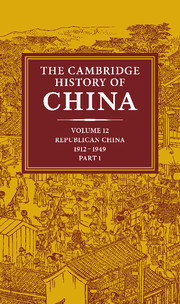Book contents
- Frontmatter
- 1 Introduction: Maritime and continental in China's history
- 2 Economic trends, 1912–49
- 3 The foreign presence in China
- 4 Politics in the aftermath of revolution: the era of Yuan Shih-k'ai, 1912–16
- 5 A constitutional republic: the Peking government, 1916–28
- 6 The warlord era: politics and militarism under the Peking government, 1916–28
- 7 Intellectual change: from the Reform movement to the May Fourth movement, 1895–1920
- 8 Themes in intellectual history: May Fourth and after
- 9 Literary trends I: the quest for modernity, 1895–1927
- 10 The Chinese Communist Movement to 1927
- 11 The Nationalist Revolution: from Canton to Nanking, 1923–28
- 12 The Chinese bourgeoisie, 1911–37
- Bibliographical essay
- Bibliography
- Index
- Republican China – physical features
- References
1 - Introduction: Maritime and continental in China's history
Published online by Cambridge University Press: 28 March 2008
- Frontmatter
- 1 Introduction: Maritime and continental in China's history
- 2 Economic trends, 1912–49
- 3 The foreign presence in China
- 4 Politics in the aftermath of revolution: the era of Yuan Shih-k'ai, 1912–16
- 5 A constitutional republic: the Peking government, 1916–28
- 6 The warlord era: politics and militarism under the Peking government, 1916–28
- 7 Intellectual change: from the Reform movement to the May Fourth movement, 1895–1920
- 8 Themes in intellectual history: May Fourth and after
- 9 Literary trends I: the quest for modernity, 1895–1927
- 10 The Chinese Communist Movement to 1927
- 11 The Nationalist Revolution: from Canton to Nanking, 1923–28
- 12 The Chinese bourgeoisie, 1911–37
- Bibliographical essay
- Bibliography
- Index
- Republican China – physical features
- References
Summary
The 37 years from 1912 to 1949 are known as the period of the Chinese Republic in order to distinguish them from the periods of more stable central government which came before and after. These years were marked by civil war, revolution and invasion at the military-political level, and by change and growth in the economic, social, intellectual and cultural spheres. If we could neatly set forth in this first chapter the major historical issues, events and Chinese achievements in these various realms, the following chapters might be almost unnecessary. In that case, however, the cart would be in front of the horses.
Our new view of the republic must come from several angles of approach. Only one is pursued in this introductory chapter, yet it appears to serve as a central and necessary starting point.
THE PROBLEM OF FOREIGN INFLUENCE
China's modern problem of adjustment has been that of a dominant, majority civilization that rather suddenly found itself in a minority position in the world. Acceptance of outside ‘modern’ ways was made difficult by the massive persistence of deeply-rooted Chinese ways. The issue of outer versus inner absorbed major attention at the time and still confronts historians as a thorny problem of definition and analysis.
Anyone comparing the Chinese Republic of 1912-49 with the late Ch'ing period that preceded it or with the People's Republic that followed will be struck by the degree of foreign influence upon and even participation in Chinese life during these years. The Boxer peace settlement of 1901 had marked the end of blind resistance to foreign privilege under the unequal treaties; students flocked to Tokyo, Peking proclaimed foreign-style reforms, and both weakened the old order.
Keywords
- Type
- Chapter
- Information
- The Cambridge History of China , pp. 1 - 27Publisher: Cambridge University PressPrint publication year: 1983
References
- 5
- Cited by

